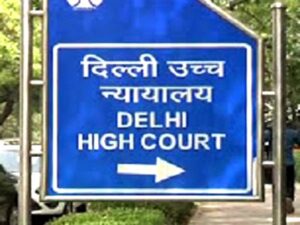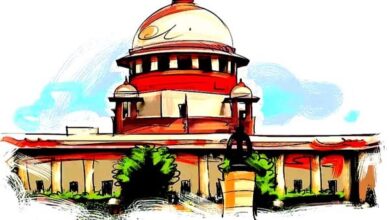OBC प्रमाण पत्र नौकरी के लिए कटआफ तारीख से पहले और बाद बने दोनों वैध obch pramaan patr naukaree ke lie kataaph taareekh se pahale aur baad bane donon vaidh

नई दिल्ली | [कोर्ट बुलेटिन] | हाईकोर्ट ने कहा है कि कटआफ तारीख के पहले और बाद में बने ओबीसी प्रमाण पत्र को एसएससी (कर्मचारी चयन आयोग) स्वीकार करने से इनकार नहीं कर सकता है। न्यायालय ने एसएससी (कर्मचारी चयन आयोग) को कटआफ तारीख के करीब चार महीने बाद बने ओबीसी प्रमाण पत्र को स्वीकार करने और इस आधार पर एक प्रतिभागी को आरक्षित श्रेणी में नौकरी देने का आदेश देते हुए यह टिप्पणी की है।
एसएससी (कर्मचारी चयन आयोग) ने भर्ती परीक्षा और टाइपिंग टेस्ट में सफल होने के बाद महिला प्रतिभागी को महज इस आधार पर नौकरी देने से वंचित कर दिया था कि उनका ओबीसी प्रमाण पत्र या तो कटआफ तारीख से पहले का बना था या फिर बाद का। एसएससी (कर्मचारी चयन आयोग) द्वारा निर्धारित मानकों के अनुसार, किसी भी भर्ती प्रक्रिया शुरू होने की तारीख से तीन साल के भीतर का होना चाहिए।
जस्टिस संजीव सचदेवा और तुषार राव गेडेला की पीठ ने अधिवक्ता अनिल सिंघल के माध्यम से सुनील पूजा द्वारा दाखिल याचिका का निपटारा करते हुए यह फैसला दिया है। पीठ ने अपने फैसले में कहा कि तथ्यों से साफ है कि याचिकाकर्ता के पास मौजूद दोनों ओबीसी प्रमाण पत्र वैध हैं।
पीठ ने कहा कि एसएससी (कर्मचारी चयन आयोग) ने खुद स्वीकार किया है कि एक अगस्त, 2012 से 17 मार्च, 2013 तक प्रतिभागी वैध ओबीसी प्रमाण पत्र जमा करा सकते थे, जिस दिन याचिकाकर्ता ने टाइपिंग परीक्षा में भाग लिया था। साथ ही न्यायालय ने एसएससी द्वारा ओबीसी प्रमाण पत्र के लिए 3 साल के कटआफ तारीख निर्धारित करने पर भी सवाल उठाया। न्यायालय ने कहा कि संपत्ति कर अधिनियम-1957 में निहित वित्तीय वर्ष शब्द के अर्थ को देखते हुए 8 जून 2009 के पहले के ओबीसी प्रमाणपत्र पर भी मान्य प्रतीत होती है।
पीठ ने कहा कि प्रमाण पत्र वित्तीय वर्ष का होता है, न कि किसी तारीख का। न्यायालय ने कहा कि याचिकाकर्ता सुनील पूजा के दूसरे ओबीसी प्रमाणपत्र जो 17 दिसंबर 2012 को जारी किया गया था पर प्रतिवादी आपत्ति नहीं जता सकते। क्योंकि उन्होंने खुद माना है कि इसे प्रतिभागी 17 मार्च, 2013 तक जमा करा सकते थे।
उच्च न्यायालय ने इसके साथ ही केंद्रीय प्रशासनिक न्यायाधिकरण के उस फैसले को खारिज कर दिया, जिसमें एसएससी द्वारा याचिकाकर्ता को वैध ओबीसी प्रमाण पत्र नहीं होने के आधार पर नौकरी नहीं दिए जाने को सही ठहराया था। पीठ ने एसएससी को याचिकाकर्ता को डाटा एंट्री ऑपरेटर के पद पर नियुक्ति देने का आदेश दिया है।
एसएससी (कर्मचारी चयन आयोग) ने अगस्त, 2012 में डेटा एंट्री ऑपरेटर की भर्ती निकाली थी। याचिकाकर्ता सुनील पूजा ने ओबीसी श्रेणी में आवेदन किया और 8 जून, 2009 का ओबीसी प्रमाण पत्र लगाया। जबकि एसएससी (कर्मचारी चयन आयोग) द्वारा निर्धारित मानक के हिसाब से ओबीसी प्रमाण पत्र एक अगस्त, 2009 से एक अगस्त 2012 तक का होना चाहिए था। भर्ती परीक्षा में सफल होने के बाद याचिकाकर्ता 17 मार्च, 2013 को टाइपिंग टेस्ट में शामिल हुई और उसी दिन 17 दिसंबर, 2012 को बना ओबीसी प्रमाण पत्र जमा कराने की कोशिश की।
टाइपिंग टेस्ट में शामिल होने के बाद भी अंतिम परिणाम में याचिकाकर्ता का नाम शामिल नहीं किया गया। इसके बाद याचिकाकर्ता ने केंद्रीय प्रशासनिक न्यायाधिकरण में याचिका दाखिल की। लेकिन न्यायाधिकरण ने याचिका खारिज कर दी। इसके बाद याचिकाकर्ता ने अधिवक्ता अनिल सिंघल के माध्यम से उच्च न्यायालय में अपील दाखिल की थी।

OBC certificate valid both before and after cutoff date for job
New Delhi | [Court Bulletin] | The High Court has said that SSC (Staff Selection Commission) cannot refuse to accept OBC certificates made before and after the cut-off date. The court made this observation while ordering the SSC (Staff Selection Commission) to accept the OBC certificate generated after about four months from the cut-off date and give a job to a candidate in the reserved category on this basis.
The SSC (Staff Selection Commission) had denied employment to a female participant after clearing the recruitment test and typing test, merely on the ground that her OBC certificate was produced before or after the cut-off date. Should be within three years from the date of commencement of any recruitment process, as per the standards set by SSC (Staff Selection Commission).
A bench of Justices Sanjeev Sachdeva and Tushar Rao Gedela gave this decision while disposing of the petition filed by Sunil Pooja through advocate Anil Singhal. In its judgment, the bench said that it is clear from the facts that both the OBC certificates with the petitioner are valid.
The bench said that the SSC (Staff Selection Commission) itself has admitted that the participants could have submitted valid OBC certificate from August 1, 2012 to March 17, 2013, on the day the petitioner had appeared in the typing test. At the same time, the court also questioned the setting of the cut-off date of 3 years for OBC certificates by the SSC. The Court held that in view of the meaning of the word financial year contained in the Wealth Tax Act, 1957, the OBC certificate dated prior to June 8, 2009 also appears to be valid.
The bench said that the certificate is of the financial year and not of any date. The Court observed that the Respondents cannot object to the second OBC certificate of the petitioner Sunil Puja which was issued on December 17, 2012. Because he himself has admitted that the participants could have submitted it till March 17, 2013.
The High Court also set aside the decision of the Central Administrative Tribunal, which had upheld the denial of job by SSC to the petitioner on the ground of not having a valid OBC certificate. The bench has ordered SSC to appoint the petitioner to the post of data entry operator.
SSC (Staff Selection Commission) had released the recruitment of Data Entry Operator in August 2012. Petitioner Sunil Pooja applied in OBC category and submitted OBC certificate dated 8th June, 2009. Whereas according to the standard set by SSC (Staff Selection Commission), OBC certificate should have been from August 1, 2009 to August 1, 2012. After clearing the recruitment test, the petitioner appeared in the typing test on 17th March, 2013 and tried to submit the OBC certificate made on the same day 17th December, 2012.
The name of the petitioner was not included in the final result even after appearing in the typing test. Thereafter, the petitioner filed a petition in the Central Administrative Tribunal. But the tribunal dismissed the petition. After this, the petitioner filed an appeal in the High Court through advocate Anil Singhal.















